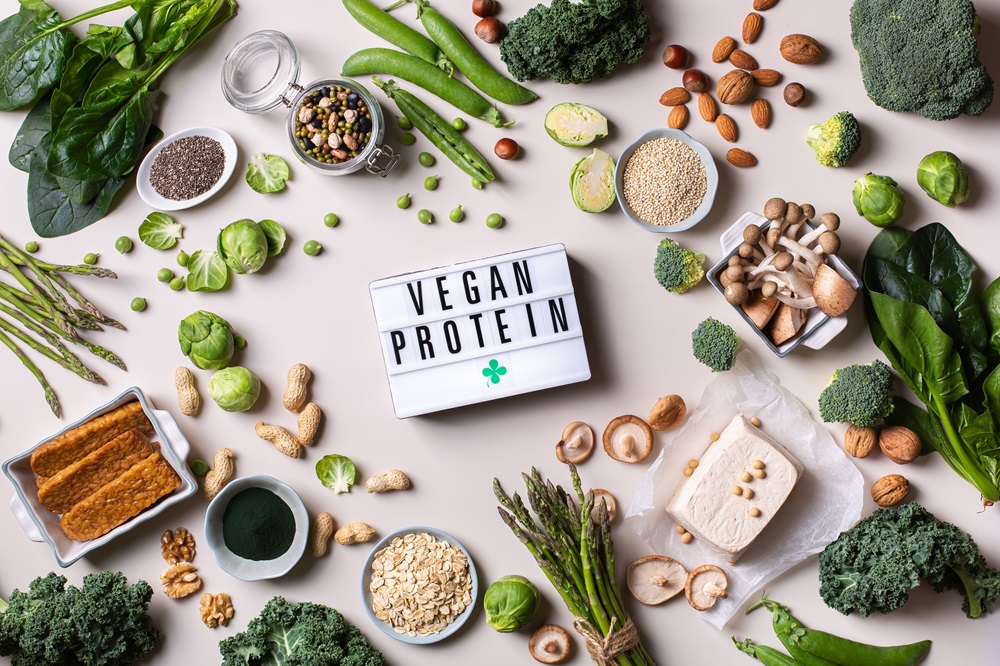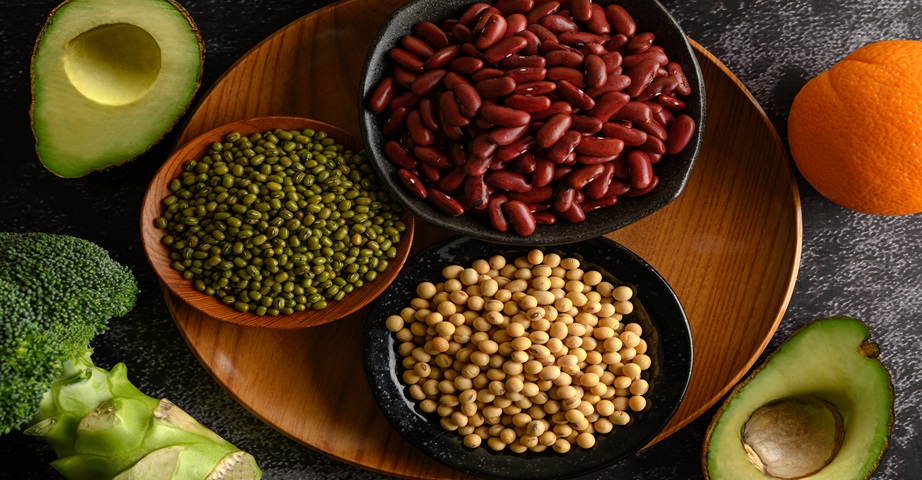
Vegetable proteins are becoming more and more popular among consumers who limit or completely abandon animal products. Vegan proteins can be an excellent alternative to animal protein, but it is important to skillfully compose a menu, enabling the delivery of all valuables amino acids to the body. What are vegan sources of protein? Does plant protein build muscle? What is the best assimilable plant protein?
Summary
What is plant protein?
Protein is one of the three macronutrients necessary for the proper functioning of the human body. It is a macromolecular chemical compound, composed of amino acids connected by peptide bonds, which accounts for about 20% of the total human body weight.
The proteins used in the daily diet can be divided due to the origin of:
- proteins of animal origin,
- plant proteins.
Proteins of plant origin are proteins obtained from plant sources, which are distinguished by a lower biological value than animal proteins. These compounds are considered to be non-complete sources of proteins, which rarely provide the human body with all essential exogenous amino acids. Plant proteins are an important element of the diet, which is why, especially among people using plant-based diets - vegetarians and vegans, it is extremely important to carefully balance the daily menu in such a way as to provide the body with all the necessary compounds.
Vegan proteins are considered to be less absorbable than proteins of animal origin. Scientific data suggest that the absorption of plant proteins in the human body may be 10-40% lower than the bioavailability of animal proteins. This is due to the fact that plant products often contain substances such as phytic acid or dietary fibre, which may hinder the absorption of valuable macronutrients in the body.
Protein requirements
The requirements for protein is an individual matter depending on body weight, age, gender, as well as health and physical activity.
The average protein requirement is about 0.8-1.2 g of protein per kilogram of body weight. Among athletes and physically active people, there is an increased demand for protein, which can be 1.8-2.2 g/kg of body weight.
Are plant proteins able to cover the daily human requirements for proteins? Of course! However, it is important to properly assess the needs of the body and properly compose a daily menu based on vegan protein sources, which will allow the body to provide all the necessary exogenous amino acids.
Recommended plant-based proteins
Plant sources of protein - protein in a vegan diet
A properly composed plant diet should provide the human body with all the necessary macronutrients, as well as valuable vitamins and minerals. In order to meet the daily demand for protein with the help of plant sources of the compound, should be included in the daily menu products such as:
- legumes, including red beans, broad beans, lentils, peas and chickpeas;
- nuts, such as peanuts, cashews, walnuts or hazelnuts;
- seeds, such as sunflower seeds, pumpkin seeds, chia seeds;
- cereals (rye, barley, corn, oats) and whole grains products such as whole grains pasta, brown rice, coarse groats.
Particular attention should be paid to soy and soy products, which are valuable vegan sources of protein. Among soy products rich in proteins, it is worth mentioning tofu, tempeh or soy milk. In addition, excellent sources of vegan protein, which are considered the best digestible plant proteins, are vegan protein supplements, which are most often based on soy protein, pea protein or pumpkin protein.
The best sources of plant-based protein - table
Although the first connotation with protein most are often products such as eggs, meat and dairy products, plant-based products can also provide significant amounts of protein to the human body. What are the best sources of vegetable protein? In which products can you find significant amounts of protein?
| Food products | Protein content [g/100 g] |
60 |
|
Yeast flakes |
45 |
Soy |
37 |
Broad bean |
26 |
Pea |
24 |
Sunflower seeds |
21 |
Pumpkin seeds |
19 |
Chickpea |
19 |
Tempeh |
19 |
Sesame |
18 |
Whole grain pasta |
15 |
Oat flakes |
13 |
Tofu |
12 |
Buckwheat groats |
12 |
Millet groats |
11 |

Does plant protein build muscle? Properties of vegan protein
Protein is the basic building block of the human body, which is part of muscles, hormones or enzymes. It is a compound necessary for the proper growth and repair of tissues, which can also play a transport role in the body. Protein can perform an energy function, providing energy to the human body, and can also support the maintenance of acid-base balance. Macronutrient can support the functioning of the immune system, and can also regulate metabolic processes.
However, can plant protein contribute to increasing muscle mass? Absolutely! A properly balanced plant diet, based on vegan protein sources, allows optimal building of muscle mass and can contribute to increasing muscle mass. In addition, the results of scientific research suggest that a menu based on plant-based products may support the development of muscle mass and repair of damaged muscle tissue at a level comparable to a diet containing both plant-based, like animal sources of protein.
The data obtained so far indicate that despite the practical discrepancies between the plant-based diet and the classic nutrition model, there are no differences in efficiency among endurance athletes. Both vegans and people following a traditional diet may have similar rates of myofibrillar protein synthesis.
Vegan dietary supplements - is it worth using them?
Among vegans and physically active vegetarians who regularly perform intense workouts, vegan protein supplements may be a helpful solution in providing the body with the right amount of protein and valuable amino acids, which are a concentrated source of well-absorbed proteins of plant origin.
On the market of dietary supplements, more and more often can be found preparations rich in plant proteins. Most often, vegan high-protein supplements contain soy protein isolate, although more and more often you can find products based on pea protein isolate, pumpkin protein isolate or hemp protein. There are also mixes that provide the athlete's body with protein from several different plant sources. Vegan dietary supplements can be found in various taste variants, which additionally increases the attractiveness of the used product.
When looking for the best protein supplement based on protein of plant origin, it is worth paying attention to the absorbability and digestibility of proteins used in the preparation, which will allow to provide the body with significant amounts of the desired macronutrient and facilitate the achievement of the intended training results.
Bibliography:





